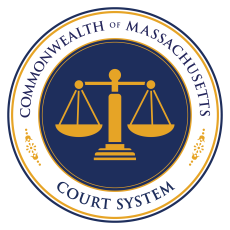Law and Legal Research
- About This Guide
- Navigating the Court System
- Legal Resources by Topic Toggle Dropdown
- Research Services Department at BPL
Legal Forms vs Court Forms
All court forms are legal forms but not all legal forms are court forms. What is the difference?
Court Forms: All court forms are legal forms. Any form that the court generates is a court form. The court generates forms which are provided to court users for certain court actions, processes, etc. Some legal forms have no official version, like a Last Will for example. These are non-standardized legal forms that the court does not produce because there is not one official version.
Legal Forms: Not all legal forms are court forms. Using the example of a Last Will, the court may accept this legal form as part of a probate proceeding, but it is not a court generated form. Other legal forms may not be needed or accepted by a court.
Managing Your Case
-
Access the Courts via Public Libraries
 The Trial Court Law Libraries' Public Library Initiative offers access to virtual court services via the comfort and convenience of your local library. Many Trial Court services and resources are now available virtually, but not everyone knows about the remote services offered by the court or has the technology needed to take full advantage of these resources. Click "more" to see participating libraries.Massachusetts Partner Libraries
The Trial Court Law Libraries' Public Library Initiative offers access to virtual court services via the comfort and convenience of your local library. Many Trial Court services and resources are now available virtually, but not everyone knows about the remote services offered by the court or has the technology needed to take full advantage of these resources. Click "more" to see participating libraries.Massachusetts Partner Libraries
• [Andover] Memorial Hall Library
• Boston Public Library - Grove Hall
• Boston Public Library - Roxbury Branch
• Canton Public Library
• Chelmsford Public Library
• Chelsea Public Library
• [Danvers] Peabody Institute Library
• Eastham Public Library
• [Foxborough] Boyden Library
• Framingham Public Library
• Marlborough Public Library
• Maynard Public Library
• Milton Public Library
• [Northampton] Forbes Library
• [Norwood] Morrill Memorial Library
• [Quincy] Thomas Crane Public Library
• [Randolph] Turner Free Library -
Massachusetts Trial Court Case Access
 Use this site to pay some court fees or to look up case information. Filed motions, judge decisions, upcoming court dates, and often PDFs of filings can be found.
Use this site to pay some court fees or to look up case information. Filed motions, judge decisions, upcoming court dates, and often PDFs of filings can be found.
Finding Forms & Court Documents
Finding the correct forms and documents for your particular legal issue can be complicated and confusing. Below are resources to first find the correct document, and then find assistance filling out the forms correctly. It is very important to know that while these forms are vetted by professionals, they still may not be accepted by a judge. Check with a legal professional or court magistrate to ensure you have the correct documents and that they are filled out correctly.
Finding Court Forms & Legal Documents
LawDepot allows you to create your own personalized legal documents specific to your state/province and personal situation. LawDepot is available through Libby.
Nolo Legal Guides are a trusted source for legal guidance. Updated regularly, their publications cover a wide range of legal topics. This link is a BPL catalog search for "Nolo's". Topic-specific Nolo guides are highlighted throughout this guide.
 Massachusetts Legal Forms by Subject. The Trial Court Law Libraries compiled this list of Massachusetts legal forms available online or by request through the law libraries. This collection primarily compiles legal forms and organizes them by subject. Samples and non-standardized forms are available including: Wills and Trusts, Quitclaim Deeds, Notices to Quit, Power of Attorney, and other samples of complaints, answers, briefs, and motions.
Massachusetts Legal Forms by Subject. The Trial Court Law Libraries compiled this list of Massachusetts legal forms available online or by request through the law libraries. This collection primarily compiles legal forms and organizes them by subject. Samples and non-standardized forms are available including: Wills and Trusts, Quitclaim Deeds, Notices to Quit, Power of Attorney, and other samples of complaints, answers, briefs, and motions.
 Massachusetts Court Forms by topic. Generated by the Commonwealth, find the court forms you need for a variety of different topics. You may also find court forms by department. Topics examples include Adoption and name change, Domestic violence, Housing, and Indigency.
Massachusetts Court Forms by topic. Generated by the Commonwealth, find the court forms you need for a variety of different topics. You may also find court forms by department. Topics examples include Adoption and name change, Domestic violence, Housing, and Indigency.
Get Assistance
Need help filling out a court or legal form? Court Service Centers may be able to help. Court Service Centers provide legal information on limited types of cases.
 Court Service Centers can answer basic questions, help with court forms, give information about court rules, procedures, and practices, and connect you with community resources. All Court Service Centers are free to court users, but there may be other fees associated with your case, such as filing fees.
Court Service Centers can answer basic questions, help with court forms, give information about court rules, procedures, and practices, and connect you with community resources. All Court Service Centers are free to court users, but there may be other fees associated with your case, such as filing fees.
Pro Se or Self-Representing Litigants
A self-representing, or pro se, litigant is someone who represents themselves in court without the help of a lawyer. Pro se litigants are sometimes eligible to receive extra assistance from legal service providers. Below is a list of resources particularly helpful to self-representing litigants.
-
Limited Assistance Representation
 Typically, lawyers represent clients for a whole case. However, there is a way to get legal help just for part of a case. This is called “Limited Assistance Representation” or “LAR.” With LAR, you and a lawyer agree what parts of a case you will handle and what parts the lawyer will handle. In other words, you limit what the lawyer does. You can use LAR for any part of a case, including helping you with legal documents, arguing for you in a court event, or negotiating a settlement.
Typically, lawyers represent clients for a whole case. However, there is a way to get legal help just for part of a case. This is called “Limited Assistance Representation” or “LAR.” With LAR, you and a lawyer agree what parts of a case you will handle and what parts the lawyer will handle. In other words, you limit what the lawyer does. You can use LAR for any part of a case, including helping you with legal documents, arguing for you in a court event, or negotiating a settlement.
-
Massachusetts Law about Self-represented LitigantsA webpage from the Massachusetts Trial Court Law Libraries. Laws, cases, and web sources with information about and for self-represented litigants in Massachusetts. See also this Court Self-Help page.
-
Court Service Centers
 Court Service Centers provide legal information on limited types of cases. For example, CSC's are only available to help unrepresented parties or people who do not have a lawyer representing them.
Court Service Centers provide legal information on limited types of cases. For example, CSC's are only available to help unrepresented parties or people who do not have a lawyer representing them.
-
Social Law LibraryThe Social Law Library provides research materials, training, continuing legal education and other services. Non-members of Social Law will not be granted access to the Library’s premises or use of its collection. However, pro se litigants who demonstrate a showing of need for specific resources that are contained in the Library’s collection and that are unavailable at any Massachusetts public library will be issued Courtesy Passes.
-
Represent Yourself in Court
This Nolo guide breaks the pretrial and trial process down into easy-to-understand steps. Whether you're a plaintiff or a defendant, this book will help you handle a bankruptcy, divorce, landlord-tenant dispute, breach of contract case, small business dispute--or any other civil lawsuit.
-
Meister Manual: for Prisoners' Lawsuits by David Meister
Formerly called Battling the Administration: An Inmate's Guide to a Successful Lawsuit, this new edition has been renamed, revised, and updated. It provides all the significant legal theory that pertains to prisoners" litigations, over a thousand case citations, sample pleadings and forms, and detailed directions for pursuing a lawsuit from beginning to end.
-
A Jailhouse Lawyer’s Manual
 JLI believes that legal education is central to breaking the cycle of incarceration. JLI has created freely available National Legal Empowerment Modules for self-education: Legal Research, Innocence Claims, Human Rights Law, Federal Habeas Claims, Freedom of Information Act, Data Justice, Legal Writing, Re-Entry, and Restorative Justice.Address: 435 W. 116th St., New York, NY 10027
JLI believes that legal education is central to breaking the cycle of incarceration. JLI has created freely available National Legal Empowerment Modules for self-education: Legal Research, Innocence Claims, Human Rights Law, Federal Habeas Claims, Freedom of Information Act, Data Justice, Legal Writing, Re-Entry, and Restorative Justice.Address: 435 W. 116th St., New York, NY 10027
Email: jlm.board.mail@gmail.com
- Last Updated: Nov 14, 2025 4:15 PM
- URL: https://guides.bpl.org/lawandlegal
- Print Page
